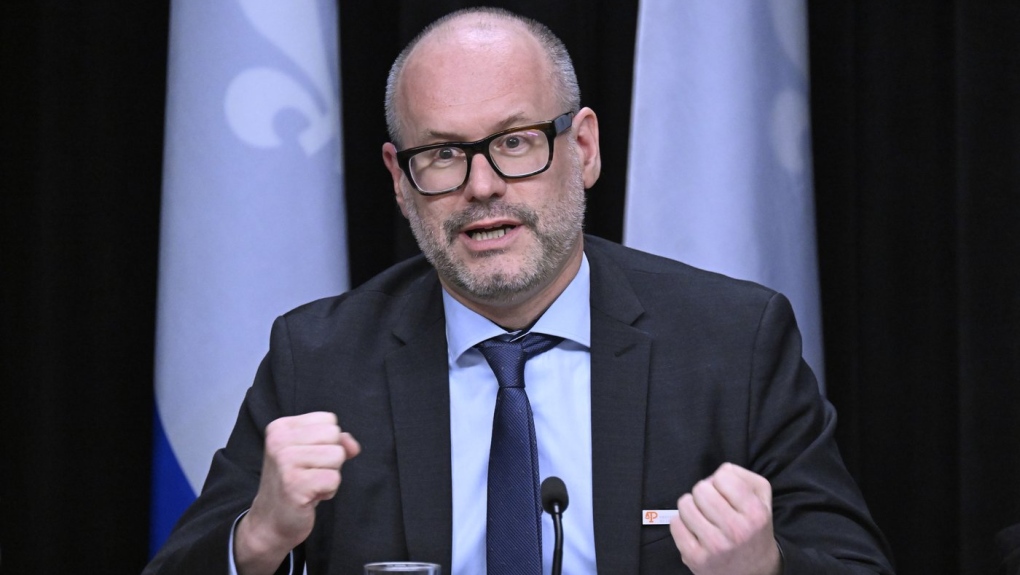A majority of Quebec civil servants are unaware of the whistleblowing law: ombudsperson
 Quebec's ombudsperson Marc Andre Dowd speaks at a news conference, Thursday, December 7, 2023 at the legislature in Quebec City. THE CANADIAN PRESS/Jacques Boissinot
Quebec's ombudsperson Marc Andre Dowd speaks at a news conference, Thursday, December 7, 2023 at the legislature in Quebec City. THE CANADIAN PRESS/Jacques Boissinot
More than six years after it came into force, the majority of government employees are not familiar with the whistleblower legislation, according to the latest special report by the Québec Ombudsperson, tabled on Thursday.
"The methods of disclosure are not well enough known and many people fear reprisals if they decide to blow the whistle," said Québec ombudsperson Marc-André Dowd at a news conference at the national assembly on Thursday.
The report also states that a number of government employees claim that "their workplace is in the grip of a 'culture of omerta,' where the duty of loyalty to the employer is over-emphasised."
Some say they have the impression that they live in an environment that is "hostile" to whistleblowers, who put themselves "at risk of being hunted down," "stalked" and possibly punished, particularly if the act "implicates a superior or a senior manager."
According to Dowd, this kind of practice goes against the spirit of the whistleblowing law: "The spirit of the law is to create safe spaces where people can feel confident, in complete confidentiality, to come forward and disclose wrongdoing," he said.
"So practices that consist of looking for emails, actively searching to find out who gave the information, do not seem to me to be compatible with the spirit of the law," added the ombudsperson.
The problem also stems from the fact that those responsible for following up disclosures (RSDs) in public bodies are too often "people high up in the institutional hierarchy," which runs counter to the ombudsperson's recommendations.
According to the report, 85 per cent of RSDs are managers or senior managers.
"It is understandable that employees may be intimidated or reluctant to make a disclosure to senior management. So changes are needed," said the ombudsperson.
Dowd maintains that the entire verification and investigation aspect of a disclosure should be the responsibility of the Québec Ombudsperson. Instead, the RSDs should play the role of "spokesperson for public integrity within their organization."
The ombudsperson obtained this information from four surveys of public servants.
"The Whistleblowers Act came into force on May 1, 2017, with the aim of facilitating the disclosure of wrongdoing committed or about to be committed in relation to public bodies and ensuring the protection of whistleblowers and people who cooperate with audits or investigations from possible reprisal measures," the report reads.
This report by The Canadian Press was first published in French on Dec. 7, 2023.
CTVNews.ca Top Stories

LIVE UPDATES Critical infrastructure 'successfully protected': Jasper park officials
Jasper National Park officials in an update said all critical infrastructure in the townsite has been "successfully protected, including the hospital, emergency services building, both elementary and junior/senior schools, activity centre and wastewater treatment plant."
BREAKING Canadian Olympic Committee removes women soccer team's head coach over drone scandal
The Canadian Olympic Committee has removed women's national soccer team head coach Bev Priestman over a drone scandal, according to a press release from the organization.
'I was just shocked': Jasper lodge owner on seeing property destroyed by wildfire
On Wednesday night, the owner of Maligne Lodge in Jasper, Alta., was shocked to receive a photo of her business engulfed in flames.
Prince William's 2023 salary revealed in new report
Newly released financial reports show that William, the Prince of Wales, drew a salary of $42.1 million last fiscal year, his first since inheriting the vast and lucrative Duchy of Cornwall.
Yukon woman narrowly escapes bear attack, credits hair clip
A woman in Yukon believes her hair clip helped save her during a bear attack.
P.E.I. and New Brunswick among most overworked provinces in Canada, study finds
A study says Prince Edward Island is the second most overworked province in Canada based on average weekly hours worked, while New Brunswick falls in third.
Alberta premier says a third, perhaps half, of all Jasper buildings destroyed by fire
Alberta Premier Danielle Smith says early reports indicate a third and perhaps up to half of all buildings in the historic Rocky Mountain resort town of Jasper have burned in a wildfire.
OPINION Prince Harry: Press intrusion and the family rift explored in new doc
Prince Harry, the Duke of Sussex, has once again found himself at the centre of media attention following his recent interview as part of 'Tabloids on Trial,' an ITV documentary on phone hacking and tabloid intrusion.
Tourist suffers 3rd-degree burns to feet after losing flip flops amid soaring temperatures in Death Valley
A tourist was hospitalized after suffering third-degree burns on his feet on Saturday when he lost his flip flops at a national park in California where temperatures soared past 50 C.

































